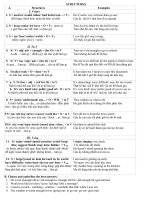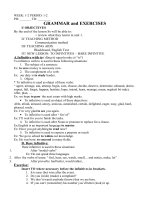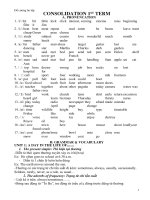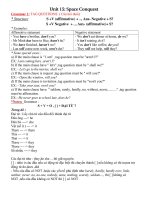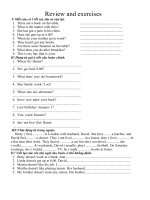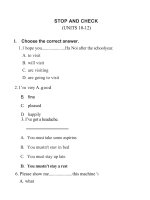Grammar and exercises 10
Bạn đang xem bản rút gọn của tài liệu. Xem và tải ngay bản đầy đủ của tài liệu tại đây (164.94 KB, 11 trang )
Đề cương ôn tập
Consolidation 1
st
term
A. Pronuncation
1. /i/: hit bit little kick click interest, coming cinema miss beginning
film it Jim
2. /i:/: heat beat meat repeat read eaten he beans leave meat
cheap Green peas cheese
3. /Λ/: study subject cousin love wonderful much month
sunny lunch under
4. /a:/ far father marvelous target guitar last are
dancing star Martha Charles dark garden
5. /e/: men said met bed pen send red pen sent Helen shelf
ten bench never get French
6. /æ/: man sad sand mat bad pan fat handbag Sam apple sat cat
Ann
7. / /: top boss doctor wrong job box socks on lost
hospital for
8. / :/: call sport four walking more talk fourteen
9. /u/: put pull full foot look cook could boot
10. /u:/ food school tooth fruit June afternoon moon shoes
11. /ə/: teacher together about other pagoda today camera water was
father river
12./ З:/ bird work church term shirt early return excursion
heard girl learn German Thursday thirsty nurse
13. /ei/ play today radio newspaper they afraid made mistake
change April page change
14. /ai/: time wildlife height buy type timetable
Friday like ride while
15. / i/ voice noise toy enjoy destroy
Royce oil boy
16. /аu/: cow town how house mouse shout loudlyour
found couch
17. /əu/: coat phonebone bowl note close rose
snow over window coat go
B: Grammar & Vocabulary
Unit 1: A day in the life of… …
1. The present simple: Thì hiện tại thường
-Diễn tả thói quen thường xuyên xảy ra ở hiện tại
Ex: He often goes to school at 6.30 a.m.
- Diễn tả 1 chân lý luôn luôn đúng
Ex: The earth moves around the sun.
-Thường có các trạng từ chỉ tần suất đi kèm: sometimes, always, usually, occasionally.
Seldom, rarely, never, as a rule, as usual…
2. The adverbs of frequency: Trạng từ chỉ tần suất
1
Đề cương ôn tập
- Liệt kê ở trên: always/sometimes……
-Đứng sau động từ “To Be”, trợ động từ (nếu có), đứng trước động từ thường
Ex: He is always late for class.
She will never see him again.
3. The past simple: Quá khứ đơn
- Diễn tả hành động, thói quen trong quá khứ, thường có thời điểm xác định như: last
night, yesterday, time+ago,…..
4. Practice
Exercise 1: Choose the correct answer a, b, c or d
1. I know….how she felt.
a. exact b. exactly b. exactness d. exacting
2. I felt quite….with my day’s work.
a. satisfy b. satisfactory b. satisfied d. satisfaction
3. The alarm goes off at 5.30.
a. rings b. strikes b. strings d. knocks
4. We are contented with what we do.
a. interested in b. excited about c. keen on d. satisfied with
5. I haven’t met him since he….school.
a. left b. was leaving c. had left d. was left
6. He’s not really interested in …….on the farm.
a. to work b. work c. working d. worked
7. My sister went to Hanoi ………….. .
a. last week b. a week ago c. for a week d. all are correct
8. I usually go out for dinner with my friends ………. Saturday nights.
a. at b. in c. on d. for
9. We ……at the station ten minutes late.
a. arrived b. came c. went d. left
10. ……….do you often go to school? - At 6.30 every morning.
a. How b. What time c. Who d. With whom
Exercise 2: Khoanh tròn các lỗi sai a, b, c hoặc d
1. Mr. Vy leaves(a) the house at(b) a quarter past five and arrive(c) in the field at
exactly(d) 5.30.
2. We haven’t seen(a) Jim since(b) he has left(c) school in(d) 2005.
3. John play(a) tennis with(b) Mary and me(c) every afternoon(d).
4. We (a) expect getting(b) a pay rise(c) next month(d).
5. He has stopped(a) play(b) football because(c) he’s too(d) old.
Unit 2: “School talks”
1. WH – questions: What, who, which, When, Why, How
Form:
Ex: Where is she?
Ex: When will you leave? What can I do for you?
2
Wh-Word + be + S +
…..?
Wh-word + Modal verb + S + main Verb +
…?
Đề cương ôn tập
Ex: Where does she live?
2. Gerund and To-infinitive (Ving & Vinf)
• Gerund : V-ing theo sau các động từ: suggest, avoid, stop, go on, mind, consider,
enjoy, like, practise, finish, postpone, keep, love,…..
Ex: I like watching TV, and she enjoys cooking.
-V-ing theo sau các giới từ, các cụm động từ, cụm tính từ sau:
apologise for, thank for, have trouble, excuse for, sorry for, have difficulty,
interested in, busy, have good time, satisfied with, worthy, have hard time ….
- V-ing theo sau động từ “Go”: (đi đâu, đi làm gì): do swimming, go fishing, go
shopping, go hunting…..
• To infinitive (Vinf)
-V-inf theo sau các động từ sau: expect, decide, want, need, hope, demand, agree,
disagree, plan, offer, like…..
Ex: I expect to see you again.
- V-inf đứng sau các động từ có tân ngữ đi kèm. (V+O+ Inf): tell, request, order,
talk, remind, want…..
Ex: She asks me to do my homework everyday.
* Chú ý: một số động từ được theo sau bởi V-ing hoặc V-inf với nghĩa khác nhau:
Stop, remember, forget, …
Ex: His brother stopped smoking.
He stopped to have a cup of tea.
Exercise 1: Choose the correct answer a, b, c or d
1. Ms. Lan enjoys ……because she loves working with children.
a. to teach b. to be taught c. teaching d. teach
2. I’d like to stay at home ……going out this evening.
a. rather than b. instead of c. more than d. better at
3. It is such a terrible day that I don’t ……..to go out.
a. want b. fancy c. enjoy d. need
4. I have such a lot of work to do that I don’t know ……..to do first
a. when b. what c. where d. why
5. The reason …….he refused this job is that he doesn’t like the boss.
a. what b. who c. why d. when
6. My father doesn’t allow me ……in his room.
a. to smoke b. smoking c. smoke d. not smoke
7. Nam ……in finding a good job in an advertising company.
a. managed b. gained c. succeeded d. got
8. It’s better to avoid ………during the rush hour.
a. traveling b. to travel c. travel d. traveled
9. It was a nice day, so we decided ………..for walk.
a. to have b. to go c. to take d. to make
10. Would you ………..looking after my children for a while?
a. mind b. agree c. stand d. care
11. I have difficulty ……..and ………..English.
3
Wh-word +Do/does/did +S + main Verb…..?
Đề cương ôn tập
a. speak-writing b. to speak-to write c. speaking-writing d. speak-write
12. They offered ……her but she refused.
a. to help b. helping c. help d. being helped
13. I don’t mind …..you ……..the washing up.
a. help-do b. helping-doing c. helping-do d. to help-to do
14. I’d like …….when I am sixty years old.
a. to rest b. to stop c. to retire d. to relax
15. The children are looking forward to ………..on holiday.
a. go b. going c. be going d. have gone
16. You must try not …….so many mistakes again.
a. make b. making c. to make d. makes
17. He advised me …………….at this time.
a. not to go out b. not go out c. not going out d. not to going out
18. We always expect ……….as many good marks as possible.
a. getting b. get c. to getting d. to get
19. This book is worthy ………for us.
a. to read b. reading c. read d. be read
20. I have trouble ………late at nights.
a. work b. to work c. working d. works
Unit 3: “People s background”’
1. The past perfect (Thì quá khứ hoàn thành)
*Form:
*Use: Dùng để diễn tả hành động bắt đầu trong quá khứ, kéo dài trong 1 khoảng thời
gian và kết thúc trước 1 thời điểm trong quá khứ
Exercise 1: Choose the correct answer a,b,c or d
1. When I first ……….abroad to study, I ……in a dormitory before.
a. traveled-was never lived b. had traveled-never lived
c. traveled-had never lived d. was traveling-had never lived.
2. He ……..London 2 years ago and I ……….him since then.
a. left-hadn’t seen b. left-haven’t seen
c. was living-haven’t seen d. left-didn’t see
3. Jim, ………since you got home from football practice?
a. are you eating b. had you eaten c. did you eat d. have you eaten
4. It rained yesterday after it ………dry for months.
a. was b. have been c. had been d. was being
5. By the time Sheila got back, Chris ………
a. have gone b. went c. will go d. had gone
6. …….do you live? In a flat, near the university.
a. Where b. When c. Who d. Whom
7. Could you please stop …..so much noise?
a. doing b. making c. to make d. to do
4
S + had + Vp2
Đề cương ôn tập
8. When she came out, her bike …….. .
a. was disappeared b. was being disappeared
c. had disappeared d. have disappeared
9. By the time Shakespeare died in 1616, he ……..more than 37 plays.
a. will have written b. had written
c. has written d. would have written
10. Since the early 20
th
century, women …..a lot of chances to pursue their interest.
a. have had b. have c. had had d. had
Unit 4: Special Education
1. The + adj
-Chỉ một nhóm đối tượng
-Động từ chia theo chủ ngữ số nhiều
Ex: The old need more care form us.
The Young hold the future in their hands.
2. Used to + Vinf
-Diễn tả thói quen trong quá khứ nay không còn nữa
Ex: I used to work for a Korean company.
My father didn’t use to get up late.
Did you use to do morning exercise?
• Phân biệt Used to + Inf và Be/get + used to + Ving
Be/get used to + Ving Chỉ một việc ta quen làm ở hiện tại
Ex: He is used to working at night.
3. Which- a connector-Từ nối- thay cho cả mệnh đề đứng trước nó.
- Hình thức viết: có dấu phẩy đứng trước “which”
EX: He’s always late for work, which annoys his boss a lot.
My father can’t come to our party, which is a great pity.
Exercise 1: Choose the correct answer
1. John is always late for class,….annoys the teacher.
a. which b. this c. what d. that
2. Now I don’t go to school on foot as I……..
a. had been b. did c. used to d. was
3. Without the Braille Alphabet, it would be very difficult for…..
a. the disabled b. the deaf c. the mute d. the blind
4. We’ve lost her phone number, which makes it difficult…her.
a. contacting b. contacted c. to contact d. contact
5. Jane…for the telephone company, but now she has a job at the post office.
a. works b. used to work c. having worked d. working
6. Our flight was delayed,….meant we had to wait for hours at the airport.
a. that is b. this is c. which d. which
7. Most of the children come from large and poor families which….them from having
proper schooling.
a. makes b. prevents c. leads d. gets
8. Our teacher is very proud….her work.
a. in b. at c. of d. with
5

